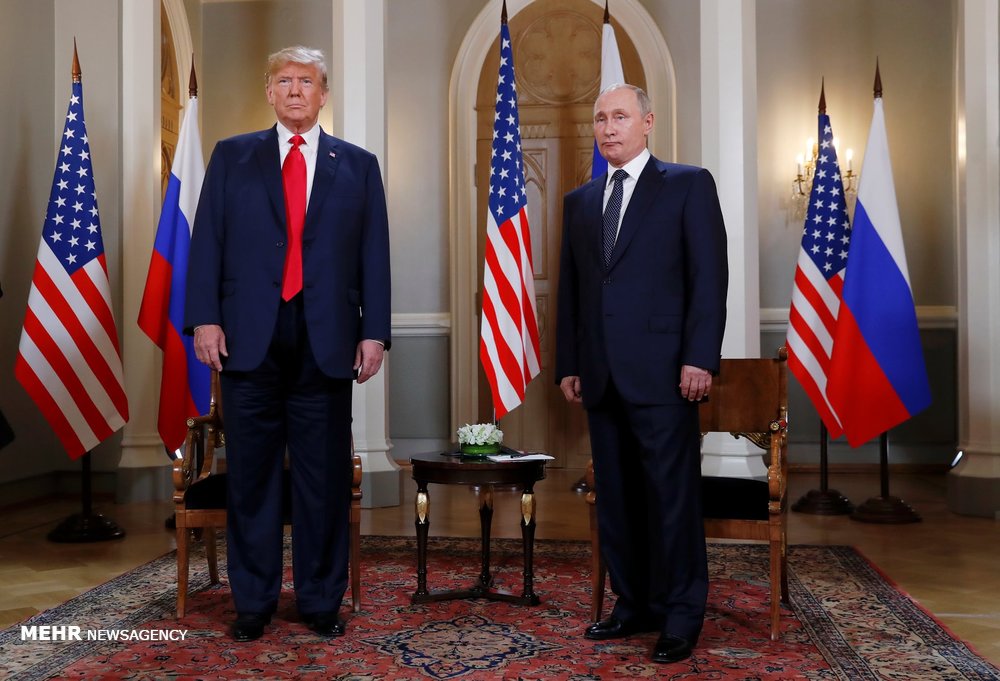A Contemplation on Trump's meeting with Putin

Finally, the meeting between the presidents of the United States and Russia was held in Helsinki, Finland. At the end of the meeting, the two sides emphasized the need for having interaction with each other to resolve international crises.
It should be noted that those criseswas mainly created by the United States, and the U.S. officials has played an important role in creating and sustaining them! On the other hand, Trump emphasized that, given the fact that the US and Russia possess 95 percent of the nuclear (and forbidden) weapons in the world, it is necessary for the two countries to interact and compromise in the field of international security! Regarding the recent meeting between Putin and Trump, there are some points that should be taken into consideration:
Firstly, the two-hour, and one-on-one visit between the presidents of the United States and Russia, led to no practical solution to the ongoing crises in the relations between the two countries. In other words, Putin and Trump merely emphasized the "necessity" of reforming and restoring inter-state relations, speaking optimistically about the resolution of existing crises.
It should not be forgotten that in the course of Putin and Trump's previous meetings, the two leaders expressed same statements about the relations between the White House and the Kremlin. However, many international experts and analysts believe that the intensity of the Moscow-Washington conflict is so high that holding such meetings can't help prevent the intensification of bilateral crises, and even prevent the US and Russia enter a new Cold War.It's not without a reason that people like former Soviet President Mikhail Gorbachev warned about the re-emergence of the Cold War in the international system.
The next point is about the U.S. is threatening approach towards Russia. This is an approach that has expanded and developed deep into Washington's foreign policy, and both the Democratic and Republican parties are committed to it.
After the recent meeting, we were witnessing widespread criticism against the President of the United States (in the domestic political atmosphere of the U.S.). The Democrat senator Chuck Schumer, and Nancy Pelosi the Minority Leader of the United States House of Representatives, and even some Republican senators like Linsey Graham have explicitly condemned the visit.
“President Trump’s weakness in front of Putin was embarrassing, and proves that the Russians have something on the President, personally, financially or politically,” said Pelosi.
Even before the visit, the U.S. senators and 18 Democratic members of the House committee on foreign affairs have called on Trump to call off the meeting with Putin. “Unfortunately,” the House group wrote, “due to your constant expressions of sympathy for Vladimir Putin, your conflicts of interest, and your attacks on our closest allies, we do not have confidence that you can faithfully negotiate with the Russian leader, and we urge you to cancel the meeting.”
Obviously, much of the equations and bilateral relations between the United States and Russia, aren't formed during the meetings between Trump and Putin, but on the political and internal scene of the two countries. American Democrats and traditional Republicans have repeatedly shown resistance to any reform regarding relations with Russia. Even during Obama's presidency, U.S.-Russian threats against each other reached their peak.
The third point here is about Russia's red lines in the international system. Today, the Russians are following specific goals and patterns that they are not willing to put aside or ignore under any circumstances.
The most important of these goals is the revival of Moscow as a pole in the international system. Obviously, the Russians are not willing to merge themselves into U.S. policies, and thus they will maintain their cautious approach in their negotiations with the Trump government. Meanwhile, any deal between the U.S. and the Russians will be hard to form, since the two sides will not interact with each other in an atmosphere based on trust. Moreover, in this equation, we should consider other variables such as "NATO" and "EU".Of the 29 NATO members, 26 are the EU member states, namely the countries that are basically trying to highlight the "Russian threat" around themselves.
This is one of the main reasons for the negative attitude of European countries towards Putin and Trump's summit. Some NATO members also believe that Trump intends to use this meeting with the Russians as a leverage to put more pressure on members of the North Atlantic Treaty Organization, so that they would be forced to meet the White House demands. However, the US-Russia relations can't be analyzed and interpreted regardless of the role which NATO and the European Union play in today's political and economic equations.
